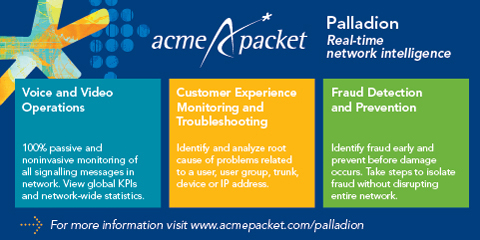Averting Modern Telecom Scams: Fraud Prevention in a VoIP World
By: Alex Hoffman

Telecommunications fraud is a significant concern for communications service providers. It robs carriers of revenues, consumes valuable network resources without remuneration and leads to customer disputes and churn. A 2011 Communications Fraud Control Association (CFCA) survey estimated global telecommunications fraud loss at $40.1 billion (USD), or nearly 2 percent of worldwide telecom revenues.
Next-Gen Networks Are Susceptible to a Myriad of Scams
Today’s telecom networks and services are susceptible to many different types of fraudulent activity. VoIP introduces a variety of new security challenges for service providers and opens the door to an assortment of new scamming opportunities for fraudsters. Next-generation fixed and mobile networks are vulnerable to a wide array of increasingly sophisticated attacks: some are based on traditional TDM/PSTN schemes, some leverage newer computer-hacking techniques and some exploit specific VoIP vulnerabilities.
Telecommunications fraud can come in many forms, and communications service providers need to be both aware of and vigilant about current scams. Some schemes are intended to bypass service-provider networks to avoid normal payment systems for international calls, while some are intended to leverage service-provider networks and sidestep payment. In the most common scheme, attackers exploit insufficiently protected PBX and voicemail systems; fraudsters will initiate calls to revenue-share numbers operated by them at the cost of the PBX owner.
Many scams are aimed directly at the enterprise, but they too can have a significant impact on the service provider. Typically, businesses don’t realize they’ve been scammed until after they receive their monthly bill. Then they can refuse to pay the fraudulent charges, threaten to switch carriers and leave the service provider holding the bag.
A recent AT&T case in which fraudsters hacked into the PBX of a Massachusetts company and made $900,000 in calls to Somalia serves as a good example. The small-business owner refused to pay his bill, so AT&T initiated a $1.15 million lawsuit against him. But after the Associated Press picked up the story AT&T dropped the suit, eating the costs and the bill while creating a negative customer experience and negative perception in the marketplace to boot.





















